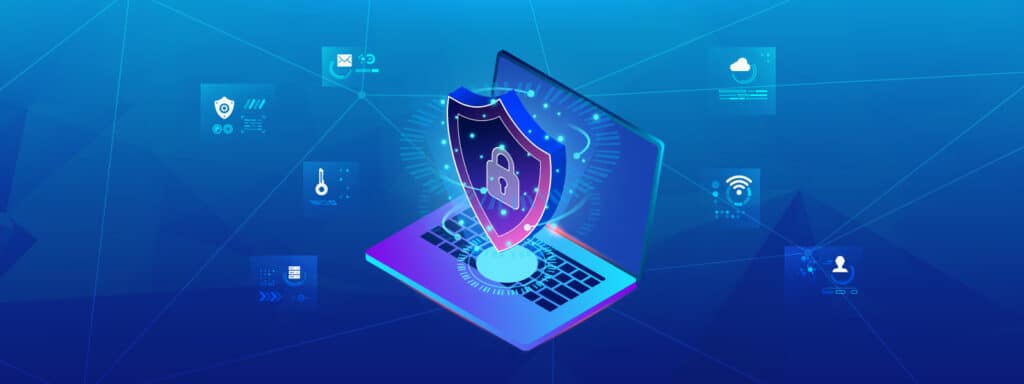Travelling on Business? Read These Cyber Security Tips before You Take Off
As a business owner, when you’re on the go, travelling for work, there are a few simple things you can do to help keep your data and devices safe. As a business traveller, it’s important to be aware of the cyber security risks that come with using public Wi-Fi networks and connecting to unsecured websites. Do not let cyber security threats disrupt your travel plans. Instead, use these 8 cyber security tips for business travellers to keep your devices and travel safely during business trips or pleasure tours.
1. Lock your devices
A digital lock – be it a PIN, password, fingerprint ID or face recognition facility – can act as the first line of defence against unauthorised access to your information. Change your PINs regularly, and do not leave your device unlocked even for a few minutes while you are travelling. Check the security settings of your smartphone, tablet or laptop to set or reset passwords. Remember to use a strong password featuring a unique mix of letters, numbers and special characters. For additional security, choose a different password for every device.
2. Stay away from public Wi-Fi as much as possible
Free Wi-Fi in lounges, airports, hotel rooms, cafes and public places can be tempting for travellers. However, be aware that public Wi-Fi hotspots come with their share of risks, especially data theft. Hackers with the right skills can easily access the accounts of people logged in to the same connection. Use a VPN if you must. This encrypts your data to become indecipherable to anyone who manages to access it. If the VPN facility is unavailable, refrain from accessing personal accounts or any other sensitive information while connected to a public Wi – Fi hotspot.
3. Turn off the auto connect feature
Most people activate the auto connect feature in their devices so that they will be automatically connected to the Wi-Fi network at home. However, keeping this setting turned on while travelling is not a good idea because your device will get connected to public Wi-Fi networks when you are within range and you may remain unaware of it. Change the setting to manual so that the device requires you to manually connect to any network.
4. Refrain from sharing location
Social media posts are replete with people enthusiastically sharing their locations as they travel. Remember that there may be people looking out for such signs. By letting the whole world know you are travelling, you are indirectly inviting thieves to your unoccupied home. Try to limit sharing your location on social media posts to minimise such risks.
5. Ensure Antivirus protection on devices

When your top priority while travelling is keeping your data – both personal and professional – safe, you must ideally start with installing anti-virus protection on all your devices. This is an easy method to stay safe from infected networks and malware. Get reputed anti-virus software and keep updating it for maximum protection.
6. Keep the OS up to date
To make sure that the OS (Operating System) on your laptop, smartphone, or tablet is not vulnerable to security threats, always keep your OS up to date. Do not forget to update the applications on your phone, especially the ones you use on a daily basis. Complete all updates prior to travelling.
7. Disable the Bluetooth function
If your Bluetooth connectivity is left on, cybercriminals can use it as a route to hack your device and extract personal data or sensitive business information. So while you are travelling, always make sure that the Bluetooth function remains disabled at all times.
8. Back up data to the cloud
Even if you follow all the tips above, there is still a risk of losing your data or even your device. To be on the safer side, back up the data on all your devices to a cloud account. Once your information has been safely stored in the cloud, you can easily access it from any location or device.
9. Ensure you have phone access overseas
You may be tempted to throw the work mobile into your office desk before you go away, but remember that mobile is probably attached to a lot of your 2FA enabled software.
Business travellers are a high-value target for cybercriminals, as they often have access to sensitive company data and travel with expensive gadgets. That’s why it’s so important to take precautions while on the road and protect your devices and data. Follow these eight tips to stay safe while travelling for business. In addition, you must remember that cyber security laws and regulations vary in different countries. It would be a good idea to read up on the latest cyber security regulations in the countries you will be visiting. Most importantly, remain alert while you are travelling and always keep an eye on your devices to lower the risk of cyber threats.
Jargon Buster
VPN: A Virtual Private Network or VPN creates a private network across a public network, giving you privacy over your data and internet usage.
Operating System: Operating system or OS is a computer software that is used for communication between a user and a system.

